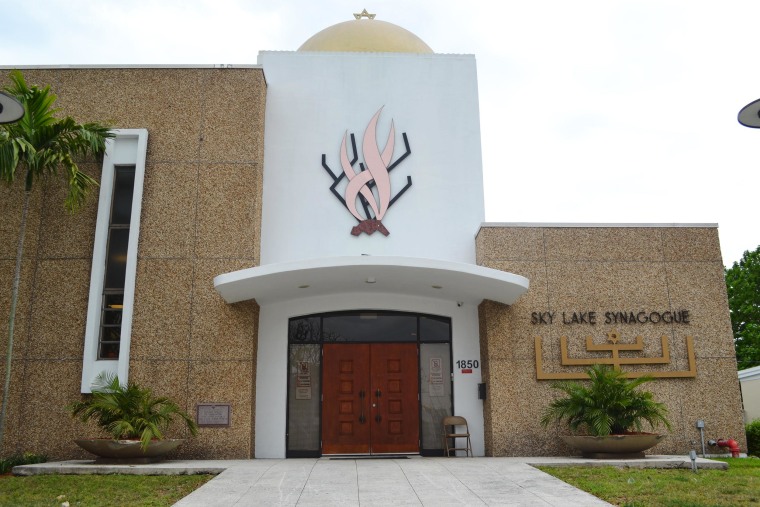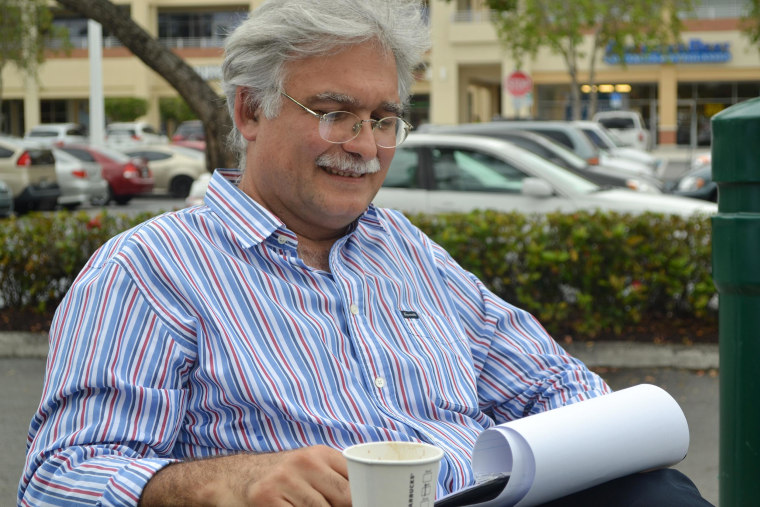AVENTURA, Fla. -- Two and a half years ago David Bassan, a Venezuelan Sephardic Jew, was vacationing in Israel when a relative was kidnapped in Caracas while driving the car Bassan had loaned him.
The relative was released and Bassan quickly realized it could have been him. Shortly after, he moved with his wife and four children to the U.S., settling in the Miami suburb of Aventura.
“That was the drop that spilled the glass,” said Bassan, sipping an espresso at a local café.
His decision to relocate was a culmination of events, which he blames primarily on the violence that has ravaged Venezuela. According to an April 2014 United Nations report on homicide around the globe, Venezuela is the only South American country with a "consistently increasing homicide rate since 1995."
There were approximately 2,000 Venezuelan Jews living in Miami-Dade County in 2004, according to a study conducted by Ira Sheskin, of the University of Miami. “There is little doubt the number has increased significantly since then,” said Sheskin, who will be releasing an updated report in October.
Venezuela’s Jewish community has decreased by 60 percent during the past 12 years, according to the Federation of Jewish Institutions of Venezuela (CAIV). In the meantime, Miami’s Venezuelan Jewish population has exploded.
Most Venezuelan Jews have settled around the area of Aventura, which already had a robust Jewish population with a network of synagogues and Jewish schools. According to Rabbi Ariel Yeshurun of Sky Lake Synagogue, their temple “was really an old age home” until flocks of young Venezuelans began arriving.
"You come here and you feel you’re in a Latin Schul. You hear Spanish being spoken,” said Yeshurun, who grew up in Israel. He said he will soon give his first sermon in Spanish; he speaks "un poco" and has been learning.
Rabbi Ariel Yeshurun of Aventura, Florida's Sky Lake Synagogue said their temple “was really an old age home” until flocks of young Venezuelans began arriving.
Last year the synagogue had to set up a tent to accomodate an additional 200 people during the high holidays. Now known as the “Venezuelan synagogue,” Sky Lake recently purchased two pieces of adjacent land to build another 30,000 square feet, including a social hall to accommodate up to one thousand people for weddings and bar-mitzvahs.
As Aventura's home prices have soared, many Venezuelan Jews are now settling in neighboring areas and becoming the majority in other synagogues as well. At the Michael-Ann Russell Jewish Community Center, Spanish is now commonly heard and Venezuelan families participate in sports and social events like they did at the Hebraica, a community center in Caracas with schools and health services.

The Jewish population in Venezuela numbered around 25,000 in the mid- 1990s, and has now shrunk to around 9,000. The history of Jews in Venezuela dates as far back as the mid-17th century, though the vast majority of Sephardic Jews immigrated at the turn of the 20th century from places like Morocco and the Ottoman Empire.
Ashkenazi Jews arrived in Venezuela during the mid-20th century, mostly from Germany, Austria, Hungary, and Romania. Currently, the Venezuelan Jewish community is divided equally between Ashkenazi and Sephardic Jews.
Just like other Venezuelan groups, the Jews have fled for similar reasons: security, economy, and the search for a different political system, according to CAIV.
Over the last few years, Jews in Venezuela who strongly support the state of Israel have been concerned with the late Venezuelan president Hugo Chavez' close relations with Iran and the Venezuelan government's support for the Palestinian cause. In 2009 Chavez expelled the Israeli ambassador after the Israeli military offensive in the Gaza strip that left over 1,000 Palestinians dead.
Experts agree the Jewish population in Venezuela numbered around 25,000 at its height in the mid- 1990s, and has now shrunk to around 9,000.
In addition, Jewish groups have complained of an anti-Semitic stance in the media because of sites like “Aporrea,” which was started in opposition to the 2002 right-wing coup attempt, and which regularly describes Israel as a "terrorist occupier."
"It's a situation that worries us," said CAIV president David Bittan, speaking by phone from Caracas, though he stressed the Venezuelan government is not anti-semitic and pointed out president Maduro has spoken of his Jewish roots.
Laila Tajeldine, a professor at the Universidad Bolivariana in Venezuela who writes for Aporrea said in an email interview that Jewish families in Venezuela live freely and without issues and has not heard of discrimination or rejection. She said there is a difference between being anti-Semitic and condemning Israel for its treatment of Palestine.
For David Bassan, his view that the media is biased factored in his decision to leave. “To feel secure that you will belong in the future is very important for Jews,” he said.
Immigrating has been tough, said Bassan, but settling in an area with a vast network of Jews has helped him adapt more easily. “You feel more at home than alone.”
This is not the first time Bassan has left his country to start over. His grandparents had immigrated to Cuba in the 1920s from Turkey and Bulgaria, and he was born in Havana. But when he was 4 years old his family left Cuba after Castro took power and they settled in Caracas.
Bassan, who was the president of the Sephardic Jewish community in Venezuela, is adapting well to life in the U.S. He continues working in real estate as he did in Caracas. He and his family continue practicing the same customs: a large family gathering at his home on Friday nights and lunch with the family on Saturday afternoons.
Immigrating has been tough, said Bassan, but settling in an area with a vast network of Jews has helped him adapt more easily. “You feel more at home than alone,” he said.
